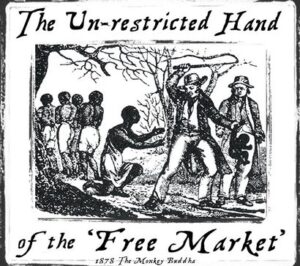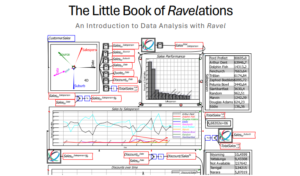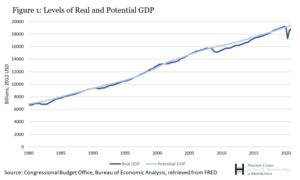This is part of our series on the book “What Has Government Done to Our Money?“.
This post discusses one of the main concepts where the author of the book (Murray Rothbard) uses the phrase “the free market” differently from how Adam Smith used it in his groundbreaking book “The Wealth of Nations“.
The free market: What the author wrote
Throughout the book, Rothbard uses the phrase “the free market”.
And he uses the phrase in such a way as to claim that markets should be free from government intervention.
The free market: What Adam Smith wrote
Per Michael Hudson, who wrote a book titled “J is for Junk Economics”, Hudson states that the phrase “free market” today means the opposite of what Adam Smith and David Hume meant in their day.
Per Hudson, Smith meant the market should be free of “rent seeking”.
Rent was money paid due to ownership and not production. A person received rent because they owned land, or interest because they owned bonds, or dividends because they owned stock.
Per Hudson, Smith thought of these people as economic parasites who profited off the economy without adding value. They in fact extracted value from the economy, which is why they were considered economic parasites.
So in Smiths’ mind (per Hudson), the phrase “free market” meant free of excessive rent-seeking. So how is an economy made free of excessive rent-seeking?
Through government policy, government regulation, government intervention.
Then, after WW1, the phrase “free market” was defined to mean free of government intervention and regulation.
Which in Smith’s view made the market free FOR rent-seekers, not FROM rent-seekers.
This freed up rent-seekers to exercise what we would call Predatory Capitalism.
I learned of this on a podcast episode which I link to below.
The free market: Does the modern use of the phrase actually mean anything?
This is a bit of a philosophical rant on my part. I did not get this from the podcast episode linked to above.
But…
- Don’t all markets, no matter how primitive they may be, have rules?
- And is not whatever people define and enforce those rules effectively “a governing body”?
- And assuming the answer to both question above is yes (which they are), can there even be a market which is free from government intervention?
- Or is the very act of defining and implementing rules for the market a form of government intervention?
To put this a bit more bluntly…
- Are markets like free-for-all jungles, or tended markets?
- And if markets are like free-for-all jungles, isn’t that another way of saying the “rules of the market” are “might makes right”?
- And isn’t that the underlying philosophy of feudalism and modern “warlord economies”?
Are not markets more like gardens than jungles?
Gardens, which need tending, rather than jungles which are wild?
This idea I DID get from a TED talk, which I link to below, but first, let me say I’ve always had a weird admiration of people who had the courage to stand against their tribe, and the speaker of this TED talk, Nick Hanauer, is such a person.
Although being as rich as he is, standing against his tribe isn’t risky for him.
He was the first non-family investor in Amazon which kickstarted his personal fortune.
But, he argues that the extreme income and wealth inequality of our modern economy threatens plutocrats like him as well as leaves millions of hardworking people behind.
And now, without further ado, I present to you Nick Hanauer and his TED talk on “The dirty secret of capitalism – and a new way forward”.
Featured image credit
I found this image on a blog post by Dr. Tyrone Grandison, specifically in his blog post titled “A quick Note on the Free Market”.



